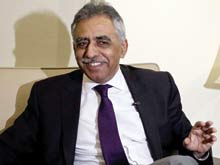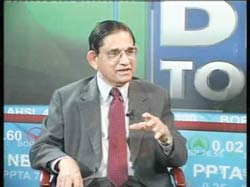When this edition of the newspaper hits the stand, the government negotiators would have told the International Monetary Fund (IMF) that it is putting off the flagship of its privatisation programme – the sale of the Pakistan International Airlines (PIA) – at least for six months from now.
When this edition of the newspaper hits the stand, the government negotiators would have told the International Monetary Fund (IMF) that it is putting off the flagship of its privatisation programme – the sale of the Pakistan International Airlines (PIA) – at least for six months from now.
Privatisation of the state-owned entities constituted a major economic policy plank of the present government which came into power with a big majority in mid-2013.
 The privatisation of the public sector entities (PSEs) were not only promised in the PML’s election manifesto but was also included in the commitments made by the government while negotiating $6.8 billion of the IMF bailout package dubbed as Extended Fund Facility.
The privatisation of the public sector entities (PSEs) were not only promised in the PML’s election manifesto but was also included in the commitments made by the government while negotiating $6.8 billion of the IMF bailout package dubbed as Extended Fund Facility.
In the first two years of its tenure, the government carried out several capital market transactions by offloading its shares in the public sector entities like PPL as everyone was anxiously looking at how the government carries out big-ticket transactions like the sale of PIA, and Pakistan Steel Mills, etc.
The proposed sale of the PIA is the first strategic and major sale of the public sector entity by the present government.
In December, the government announced to sell 26 percent of the strategic shares of the airliner along with the management control by the end of July 2016.
But the process has been facing hurdles from the very first day when it was launched.
Soon after the announcement of the sale plans, the government decided to turn the airlines into a “corporate company” through a presidential ordinance, by amending the 1956 law that bars PIA from being privately owned.
The move triggered strong protests by the workers who feared large scale layoffs by the new owner in case privatisation went ahead.
The employees went on strike and staged protests, disrupting administrative affairs as well as flight operations throughout the country. The workers also blocked a PIA board meeting on the plea that it would deliberate on the privatisation plans, which delayed the release of the company’s annual report.
Though the Finance Minister Ishaq Dar tried to placate the agitating workers by saying the government had no plans to privatise PIA and it was just looking for a strategic partner, and that none of the workers of the company would be fired.
However, these assurances did not put out the rage among the workers, forcing the government to step back.
“We have proposed to the workers’ union that we will put off the process for six months,” the Minister of State for Privatisation, Muhammad Zubair told Money Matters shortly after government representatives met with the PIA trade unions’ officials on Friday.
“We will use this six-month period to try and convince the workers about our plans or get convinced if they have strong arguments,” he added. Zubair said “no ego” is involved as far as the government is concerned and it is ready to listen to the workers’ point of view as well as of the opposition parties on this issue.
“If they have a good alternate strategy, we are ready to accept it,” he added.
However, he said the workers’ as well as the political parties need to clarify whether they are totally against the privatisation process or they only differ with the government over its strategy.
“If they differ with the strategy then adjustments could be made in it. But if they are against the (privatisation) process then they should come up with an alternate solution. If that is tangible and sound, we will not hesitate to accept it.”
Zubair, who was speaking a day before joining the government team’s meeting with the IMF representatives for the quarterly review of the bailout package, said they would put the revised schedule of the PIA privatisation before the IMF in the meeting. The sale of the PIA during the current year was one of the preconditions of the IMF for the release of the quarterly tranche, but analysts believe the IMF is most likely to issue another waiver, as it has done before, even if the government missed out on its commitment.
The critics, however, blame the government for carrying out the process in a haphazard manner without doing any proper homework.
Privatisation has always been a sensitive issue throughout the world as trade unions take it as a move by the capitalists to monopolise the economy and exploit the workers and labours.
Therefore, the protests by the workers over the matter of privatisation of the PIA are not unexpected.
The critics say the government should have opened talks with the trade unions long before the launch of the process to address their concerns.
Moreover, the way the presidential ordinance was promulgated and the government tried to push a bill turning an ordinance into a law in the parliament, added fuel to the fire.
Interestingly, the treasury benches have mostly been vacant in the parliament, but there was an unusually high attendance of the government lawmakers, when the bill was to be moved in the National Assembly.
The government also missed an opportunity to hold talks with the opposition to ensure the smooth passage of the bill and instead tried to bulldoze it through the house without much debate.
Though the Pakistan Muslim League-Nawaz (PML-N) government got it passed by using its majority in the house, it was vehemently opposed not just by the opposition parties like Pakistan Peoples Party, Tehreek-e-Insaaf, Jamat-e-Islami but also its ally, Jamiat Ulema-e-Islam (Fazl) group.
However, the opposition led by PPP, which holds majority in the Senate, has vowed to give a tough time to the government when it moves the bill in the Senate.
 “We are opposed to the privatisation of the PIA and our leader Bilawal Bhutto Zardari has given many statements in this regard,” PPP Senator Saeed Ghani said.
“We are opposed to the privatisation of the PIA and our leader Bilawal Bhutto Zardari has given many statements in this regard,” PPP Senator Saeed Ghani said.
He said the PML-N has championed the privatisation process since the 1990s but it needs to look into the outcome of the previous transactions before putting other entities under the axe.
“We have been asking them to tell us what benefits the national economy has accrued from the privatisation process so far,” he asked.
He said according to his information, most of the entities privatised have shut down while those still running are doing very bad.
Moreover, Ghani said the government has created “cartels” by selling off public entities which has enriched individuals instead of workers and the common people.
Interestingly, the PPP’s previous government has had a full-fledged privatisation minister when it was in power, though Ghani said his government did not carry out any major privatisation during its tenure.
He dispelled the impression that the previous government did not follow through its privatisation plans because of non-availability of potential investors to buy entities over fears of kickbacks and lack of transparency surrounding the government.
The privatisation minister said the government has briefed the National Assembly as well as Senate committees on the financial position of the PIA and other sick public sector entities over the past ten years to build its case for their privatisation.
“We have taken them into the confidence by placing facts and figures before them,” he said and reiterating the government is still open to alternate suggestions, if any.
Renowned economist Shahid Hasan Siddiqui, however, said the privatisation of PIA has never been in the wish list of the public entities the PML-N had planned to sell.
“In their election manifesto, they had promised to convert PIA into a highly profitable organisation. There was no mention of privatisation.”
He said the PML-N changed its mind after coming into power and finance minister wrote a letter to the IMF telling it that the government plans to privatise the national flag carrier.
He accused the government of deceiving the masses by saying that it is only searching for a strategic partner and it has no plans to privatise the PIA.
“If you are selling 26 percent of the strategic shares along with the management control then it is privatisation,” he said, asking “what else is privatisation. They are just cheating.”
Moreover, he said the government is desperately pushing for the privatisation of public entities like PIA to cover its mounting budget deficit and build up foreign exchange reserves.
“If one sells off his wife’s jewellery or disposes off his house and starts living in a big rented house and also buys a luxurious car then this transaction many bring short-term comfort to that person and his family but in the long term it’s a big loss,” Siddiqui said.
“Basically they are selling off public assets to meet their current expenses to cover up their failures,” he said and added, “basically they are not privatising. They are carrying out disinvestment.”
The writer is a senior journalist based in Islamabad